Public Organizations Are State Partners in Providing Psychosocial Assistance to Labor Migrants
Read also

DUSHANBE, 25.10.2023 (NIAT Khovar) – The World Health Organization (WHO) states that mental health is a state of well-being in which a person is aware of his/her abilities, can cope with the normal stresses of life, work productively, and contribute to his/her community. In general, it is a broad term that encompasses a spectrum of different conditions including depression, anxiety disorders, trauma, stress, chronic pain, low self-esteem, and more. Fluctuations in our emotional state throughout our lives are quite normal. However, if these fluctuations occur for no reason and affect your quality of life, it could be a sign that you are suffering from a mental illness.
According to various studies, migrant workers are exposed to numerous negative factors during their stay abroad, such as delayed wages or non-payment, poor working conditions, separation from family, disempowerment caused by illegal employment, etc. This has a significant impact on their mental well-being and can cause further serious illnesses.
“The trend has changed, — says Rafoat Boboeva, — Previously, labor migrants are not only breadwinners for the family. At present, we have to take into account that they themselves need support. There are good reasons for this. First, many returned migrants are those who have been deported and have been banned from entering the Russian Federation. Secondly, they have been unable to find employment for a long time. Therefore, they are under stress. The situation is sometimes so dire that some families of labor migrants are not even able to get their children ready for school. During the last nine months of this year, more than 100 citizens applied to our organization for psychosocial assistance. More than 20% of them are men who returned from labor migration and were advised to contact our organization by the local administrations. Previously, our organization focused on psychosocial assistance for people with disabilities, single women, and people in conflict with the law. The experience of recent years has shown that it is necessary to expand the range of services and not to limit ourselves to the generally accepted stereotypes of vulnerable categories of people”.

Upon return home, migrants experience significant stress and the need for psychological support. The IOM study revealed problems in migrants’ access to necessary psychosocial services and high stigmatization of people with mental health problems.
Zebo Kadyrova, a member of the Tajik Association of Psychologists, who works at the Department of Psychiatry, Neurology and Clinical Psychology of the Tajik State Medical University, commented on the situation with the insufficiency of state social services and alternative psychological centers functioning under public organizations for returned migrants with psychosocial needs. “First, it is hard to work with people who have behavioral disorders, intemperance, inability to keep their emotions and feelings under control, who suffer from darkening of consciousness, experience euphoria, lack of self-criticism, insanity, etc. Secondly, psychiatrists and psychologists have a lot of problems; they have no additional payment for harmfulness; it is difficult for them to visit remote areas. Thirdly, there is no motivation for young specialists in the districts – administrations have to provide them with land for subsidiary farms or housing. The problem is aggravated by the lack of rehabilitation centers for patients with mental illnesses, who stay in psychiatric hospitals for years, losing their professional and social skills”.
However, as Zebo Kadyrova points out, there are also some positive aspects. “The interest of the younger generation in psychology is increasing. More and more medical students are linking their future with clinical psychology and psychiatry. People tend to turning to professionals rather than to charlatans, fortune-tellers and sorcerers. The task of the Association of Psychologists is to organize a unified professional community of clinical psychologists, psychotherapists and psychiatrists and to train specialists for our country: criminal and clinical psychologists, psychotherapists and psychoanalysts”.
In addition to the Association of Psychologists, there are a number of other public organizations in the country that assist vulnerable groups, including migrant workers and members of their families.
The “Themis” Social and Legal Support Center,[1] in partnership with IOM Tajikistan, has been working since 2009 to combat human trafficking and protect the rights of vulnerable migrants and their families. The organization has a team of specialists consisting of lawyers, attorneys, psychologists and social workers who provide services to beneficiaries in Dushanbe and Cities and Districts of Republican Subordination. When necessary, specialists of the NGO “Themis” travel to remote regions.
“The mechanism for providing assistance has been improving year by year, — says Goibnazar Davlatbekov, a staff member of “Themis”. — First, we identify the beneficiary and, if he or she fits our criteria (a victim of human trafficking, a vulnerable migrant), we determine his or her needs, assign the necessary services and provide appropriate assistance. If psychological assistance is needed, we provide a psychologist; if social assistance is needed, we assign a social worker; if legal advice or protection is needed, the organization provides a lawyer or attorney. Over the past years, hundreds of our compatriots have received assistance within the framework of the project being implemented with the support of IOM Tajikistan”.

Media organizations also assist the state in developing services for labor migrants. With the support of the European Union, the “Tiroz” TV and radio company (Sughd region) in partnership with local authorities has created an info-educational portal “Migrant Mobile”[2] – a specialized thematic website and its interactive mobile application, uniting migrants and their family members with all government agencies, public associations, civil activists, local authorities and the media working in this area.
Provision of psychosocial assistance by NGOs will help to compensate necessary services for labor migrants and their families. At the same time, the sustainability of NGOs, which often depend on grant assistance from international donors, requires attention from government structures. In the context of a shortage of specialists in primary health care, community organizations would provide basic low-threshold services in terms of psychological and psychosocial assistance to the population. The mechanism of social contracting and state grants for public organizations can be one of the solutions to this problem.
It should be emphasized that due to the adoption of the law “On the state social order”[3] in 2008, mechanisms of national financing of activities and projects of non-profit organizations aimed at meeting social needs and solving socially significant problems related to health, social protection, employment and reintegration of migrant workers and members of their families were established. According to Kurbonali Kurbonzoda, Head of the Social Protection Department under the Ministry of Health and Social Protection of the Population, 57 public organizations in Tajikistan receive grants from the national budget to assist persons with disabilities, which includes psychosocial support.
According to the Ministry of Labor, Migration and Employment, there are 68 Tajik diasporas in the Russian Federation. During the difficult period of the COVID-19 pandemic, the Tajik diasporas provided invaluable assistance by helping their compatriots with food, personal protection items and providing psychosocial support. Migration services of the Ministry of Labor, Migration and Employment actively cooperate with the diasporas and refer migrants for legal and social assistance.
“Spouses Khurshed and Fotima Odinaevs, out of desperation and being in stress, turned for help to the Tajik Culture Society “Somon” in the Russian city of Yekaterinburg, where they said that they had both been working for a cleaning company for several months. The husband was responsible for cleaning the external area, and the wife was cleaning the internal premises. They were cheated, paid absolutely nothing, and left homeless. We try not to advertise our charity work, but migrant workers often come to us with such problems, and we cannot but support them, as we understand that due to psychological barriers, notions of “somehow, it is not accepted” or “not to take quarrels out of the house”, most of us turn for help in the most extreme cases. There are even cases when a person is on the verge of suicide, — says Farukh Mirzoev, chairman of the Society’s board. — We have qualified lawyers who provide necessary services to the victims. In the above example, we helped the Odinaevs family not only in receiving compensation, but also in finding employment. Fotima had a medical degree and we found a suitable job for her”.
In order to intensify cooperation between state and local authorities and public organizations operating in the country and abroad, a “Concept on the involvement of foreign compatriots as partners in the development of the Motherland” was adopted.[4]
As priority steps, the Concept envisages the creation of necessary legal, social, cultural and educational conditions for Tajik diasporas, labor migrants and compatriots living abroad – to protect spiritual unity and develop a sense of national identity. The Concept requires the development of cooperation between the state and local authorities, public organizations, Tajik diasporas, migrant workers and foreign compatriots. For this purpose, the Concept envisages the need to create a “National fund for assistance to Tajik diasporas, labor migrants and foreign compatriots”.
Many efforts have been made in Tajikistan in recent years to organize pre-migration training of citizens wishing to work abroad: language courses, career guidance, a system of targeted recruitment for employment abroad, job fairs, labor migration centers established jointly with foreign employers. Together with international organizations, the country is implementing projects aimed at reintegrating returned migrant workers into the economic life.
However, it is also necessary to pay special attention to the psychological health of labor migrants, as the stresses associated with labor migration become a serious challenge for the national health care and the social protection system.
Preserving the mental health of Tajik citizens in labor migration is possible only through the partnership of state and local authorities with public organizations, Tajik diasporas, unions and associations of migrant workers inside the country and abroad. A multilateral partnership will not only make it possible to effectively address existing psycho-emotional and socio-economic problems of labor migrants and their families, but will also have a positive impact on reducing poverty, creating new jobs, improving the Human Development Index, achieving the Millennium Development Goals (MDGs) and sustainable development in the Republic of Tajikistan.
Author: Shoira Toirova
[1] Social and Legal Support Center «Themis” https://femida.tj/ru/
[2] Info-educational portal “Migrant Mobile” https://migrant-mobile.com/o-proekte/
[3] The Law of the Republic of Tajikistan, #482, December 31, 2008 “On the state social order”. Electronic resource: http://www.adlia.tj/show_doc.fwx?Rgn=14234
[4] The concept of attracting foreign compatriots as partners in the development of the Motherland from May 29, 2010, № 227. Electronic resource: http://adlia.tj/show_doc.fwx?rgn=15502











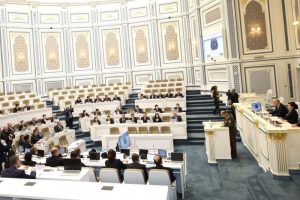 Tajikistan Approves Protocol to Agreement on Forces and Means of CSTO Collective Security System
Tajikistan Approves Protocol to Agreement on Forces and Means of CSTO Collective Security System Davlatshoh Gulmahmadzoda Attends Meeting of Russian Foreign Minister with CIS Ambassadors
Davlatshoh Gulmahmadzoda Attends Meeting of Russian Foreign Minister with CIS Ambassadors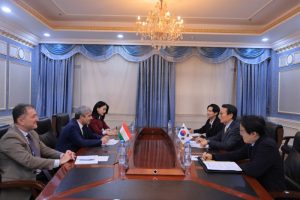 Tajikistan–Korea Discuss the Current State and Further Development of Bilateral Relations
Tajikistan–Korea Discuss the Current State and Further Development of Bilateral Relations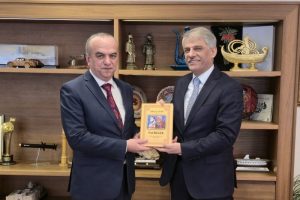 Tajikistan and Turkey Discuss Prospects for Tourism Cooperation
Tajikistan and Turkey Discuss Prospects for Tourism Cooperation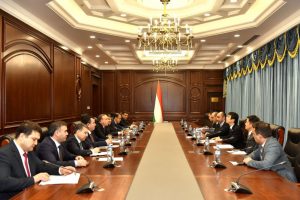 Tajikistan and JICA Discuss Expanding Economic and Technological Cooperation
Tajikistan and JICA Discuss Expanding Economic and Technological Cooperation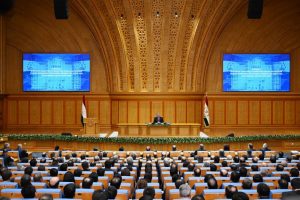 Tajikistan’s GDP Reaches 176.9 Billion Somoni in 2025, Economy Grows by 8.4%
Tajikistan’s GDP Reaches 176.9 Billion Somoni in 2025, Economy Grows by 8.4% The Issue of Attracting Indonesian Investment to Tajikistan’s Economy Discussed
The Issue of Attracting Indonesian Investment to Tajikistan’s Economy Discussed














